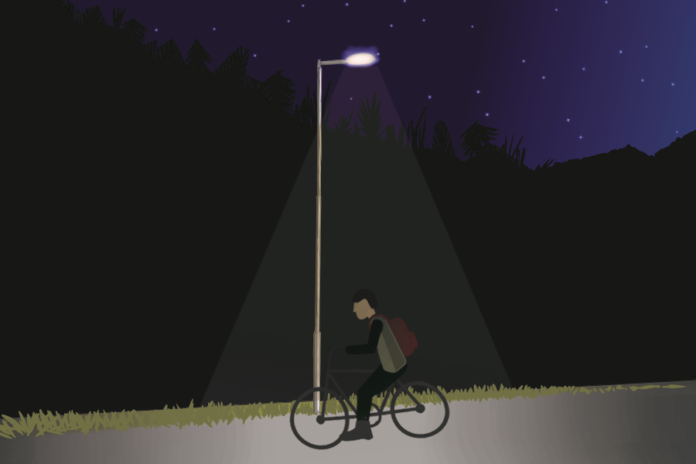UC Davis students weigh in on whether the city should expand outdoor nighttime lighting
By KACEY CHAN — features@theaggie.org
Despite Davis’s reputation as a safe city, UC Davis students have concerns about how poorly lit many streets are at night.
Given the rainy weather over the past few months, many students say their worries have only intensified.
Hanni Sung, a second-year global disease biology major, pointed to many areas on the UC Davis campus where she feels it is hard to see in the dark.
“There’s definitely a lot of unlit places, like the Arboretum or Shields Library,” Sung said. “A lot of roads and bike pathways, too, like Sprocket Bikeway, feel quite scary at night.”
Many students who often stay late on campus feel unsafe at night due to inadequate street lighting. According to the Pedestrian and Bicycle Information Center, a site funded by the U.S. Department of Transportation, street lighting is important for improving pedestrian visibility and personal security, increasing safety for both pedestrians and drivers.
Sung said that it feels dangerous walking to the bus terminals to make her way home after dark. Makenna Yokoyama, a second-year communication major, agreed that the Memorial Union bus terminal is very dark at night.
“There are some smaller areas of the MU that are really unlit,” Yokoyama said. “Whenever I leave basketball practice at night to wait for the buses, it’s way too dark.”
Most of the student body lives off-campus and many rely on walking, biking and public transportation to get around campus and the surrounding areas. For those who do not have cars, traveling back to their homes from campus at night can feel really unsafe.
Alyssa Enriquez, a second-year linguistics major, said the lack of lighting in the city of Davis also makes it difficult to navigate in the dark.
“Literally all of the sidewalks and walkways along Anderson [Road] are dark at night,” Enriquez said. “Most surrounding areas by apartment complexes I’ve been to like Arlington Farm in West Davis or Temescal in North Davis are incredibly dark to get to at night.”
Enriquez said that she even had to memorize when she should pull the bus cord to signal the driver to stop on her commute home at night.
“There is only one bright landmark in the neighborhood, so I’ve learned to time it from there,” Enriquez said.
Another key concern for students is the downtown area.
“Some less popular streets downtown have almost no street lights,” said Amy Zhang, a second-year electrical engineering major. “The whole area next to Mishka’s Cafe is quite dark at night when compared to the rest of downtown.”
A possible reason for the lack of lighting might be to prevent light pollution or “light spill” — a concept which refers to the “presence of unwanted or misdirected light,” according to a report from the City of Davis. It goes on to mention that while street lighting is provided, they want to ensure that it does not become a “nuisance” or “diminish the view of the clear night sky […] and disturb wildlife in natural habitat areas.”
Furthermore, the report claims that the city “requires developers to install lights and dedicate them to the city.”
“[The City’s] standards dictate the type of lights and the spacing or mounting heights based on the classification of the road that is being lit,” Ryan Chapman, the assistant director for the Public Works — Engineering and Transportation Department at the City of Davis, stated in an email. “These standards are used when new subdivisions or streets are built and have changed over time so different parts of the City would have met the lighting standards that existed at the time they were constructed, which could be different than what exists today.”
Chapman said those who have concerns about lighting in specific locations can submit a service request online.
Similarly, for areas reported to be darker at night like the Arboretum, implementation of street lighting falls under the purview of school-specific departments like the UC Davis Arboretum and Public Garden.
The variation in responsibility for nighttime lighting may make student concerns about the issue difficult for one institution to address. Street lighting is left under the discretion of different institutions or enterprises and their varied obligations, making it challenging to coordinate a solution. However, many students hope they may see an expansion of outdoor and nighttime lighting throughout Davis in the future.
Correction: A previous version of this article was missing relevant information about the City of Davis’s lighting standards. It has been updated to include an additional email interview from the City’s Public Works Department.
Written by: Kacey Chan — features@theaggie.org








